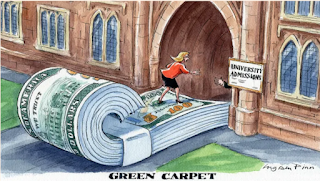Literature Review #1
Sandel, Michael J. Tyranny of Merit: What's Become of the Common Good? Farrar, Straus and Giroux, 2020.
About the book
The book discusses how the almost sacred principle of meritocracy is exacerbating inequality by reinforcing upper-class privilege. The hubris that meritocracy generates among the winners have led to a mistaken impression that winners have made it on their own while imposing harsh judgment on those left behind, who have no one to blame but themselves. The book also explores possible alternatives to meritocracy and discuss whether they could contribute to making a just society.
Author
Key terms
- Meritocratic hubris: “tendency of winners to inhale too deeply of their success, to forget the luck and good fortune that helped them on their way” (Sandel, 28).
- Politics of humiliation: How meritocratic faith “denigrates the losers, even in their own eyes” as their failure is considered to be their own doing due to their lack of talent and effort (Sandel, 29).
- Free-market liberalism: argument made by Friedrich A. Hayek that “market outcomes have nothing to do with rewarding merit” (Sandel 121).
- Welfare state liberalism (or egalitarian liberalism): argument made by John Rawls that a fair meritocracy cannot make a just society as it “still permits the distribution of wealth and income to be determined by the natural distribution of abilities and talents” (Sandel, qt. in 123).
Quotations:
“The relentless emphasis on creating a fair meritocracy, in which social positions reflect effort and talent, has a corrosive effect on the way we interpret our success (or the lack of it). The notion that the system rewards talent and hard work encourages the winners to consider their success their own doing, a measure of their virtue—and to look down upon those less fortunate than themselves” (Sandel, 28).
“But the meritocratic faith adds insult to injury. The notion that your fate is in your hands, that ‘you can make it if you try,’ is a double- edged sword, inspiring in one way but invidious in another. It congratulates the winners but denigrates the losers, even in their own eyes” (Sandel, 29).
"The more we view ourselves as self-made and self-sufficient, the less likely we are to care for the fate of those less fortunate than ourselves. If my success is my own doing, their failure must be their fault. This logic makes meritocracy corrosive of commonality. Too strenuous a notion of personal responsibility for our fate makes it hard to imagine ourselves in other people’s shoes" (Sandel, 59).
Value:
This book would be really valuable for my research as it provides rich and incisive analysis on how the seemingly attractive meritocratic ideal has gone wrong. I would be able to discover how our changing attitudes toward winning and losing has poisoned our politics and how the hubris among the winners leaves he disadvantaged losers humiliated.



Comments
Post a Comment